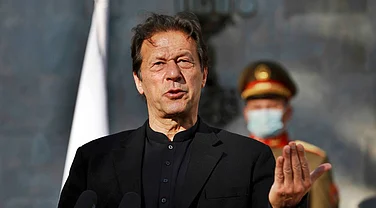US President Joe Biden on Tuesday announced that a US airstrike has killed Al Qaeda chief Ayman al-Zawahiri.
Al-Zawahiri, who was earlier Osama bin Laden's deputy, was also among the planners of September 11, 2001 terrorist attacks.
Biden in a televised address said that Al-Zawahiri was killed in an airstrike in Afghanistan's Kabul on Saturday. He added that he was in Kabul with his family members, but no family member or civilian was harmed in the strike that killed Al-Zawahiri.
Biden recalled the commitment made at the time of withdrawal from Afghanistan to not allow its territory to be used for terrorism, and said that the airstrike that killed Al-Zawahiri is a proof of it.
Here we explain what's Al-Qaeda, the role of Al-Zawahiri in terrorist activities, how he was killed in Kabul, and what's the significance of his killing.
Al-Zawahiri's terrorist journey
Al-Zawahiri was born June 19, 1951 in Egypt. He was a physician by training and came from an elite Egyptian family that had produced up to 40 doctors by 2001, according to a biography published by the Federation of American Scientists (FAS).
Despite a steller family background and medical education, Al-Zawahiri did not join the ranks of medical practioners of his family. He joined the jihad and founded Egyptian Islamic Group (EIJ), which merged with Al-Qaeda in 1998.
Al-Zawahiri took over as the cheif of global jihadist organisation Al-Qaeda after Osama bin Laden was killed by US forces in 2011. He was previously the second-in-command to Bin Laden and was closely involved in some of the biggest terrorist attacks against the United States, including the 9/11 attacks.
In 1966 — at the age of 15, Al-Zawahiri "helped form an underground cell devoted to overthrowing the [Egyptian] government and establishing an Islamist state", wrote Lawrence Wright in his book The Looming Tower. Notably, the objective of EIJ that Al-Zawahiri later founded —and merged with Al-Qaeda— was also to establish Islamic rule in Egypt by overthrowing the secular state.
The FAS biography adds that after serving a three-year sentence, Al-Zawahiri left Egypt and reached Pakistan via either Kuwait or Saudi Arabia. He began practicing medicine in Pakistan's Peshawar where he met Bin Laden.
Al-Zawahiri's acts of terror
Al-Zawahiri has been involved in the following major terrorist acts:
1. Attempted assassination of Hosni Mubarak: Al Zawahiri-founded EIJ made an attempt on then-Egyptian President Hosni Mubarak's life in 1995. It was unsuccessful.
2. Egyptian embassy bombing in Pakistan: EIJ's deadliest attack was its bombing of Egypt's embassy in Islamabad, Pakistan, in 1995, in which 17 people were killed, according to Britannica Encyclopaedia.
3. USS Cole Bombing: On October 12, 2000, two suicide pilots of a small bomb-laden boat detonated their vessel next to US warship Cole, killing 17 US soldiers and injuring nearly 40 others, according to FBI website.
4. US embassy bombings in Africa: On August 7, 1998, US embassies in Kenya's Nairobi and Tanzania's Dar es Salaam were bombed, killing 224 people —including 12 Americans— and injuring more than 4,500, according to FBI website.
5. September 11, 2001 (9/11) attacks: President Biden on Tuesday said that Al-Zawahiri was "deeply involved" in the 9/11 attacks.
He said, "He [Al-Zawahiri] was his [Bin Laden's] number-two man, his deputy at the time of the terrorist attack of 9/11. He was deeply involved in the planning of 9/11, one of the most responsible for the attacks that murdered 2,977 people on American soil."
Besides these attacks, Al-Zawahiri also played a role in 2004 train bombings in Madrid and the 2005 London bombings, according to Australia-based ABC News.
How was Al-Zawahiri killed?
President Biden said on Tuesday that Al-Zawahiri was located in Kabul earlier this year, where he had moved to be with his family. He ordered the strike following all the confirmations.
He said, "After carefully considering the clear and convincing evidence of his location, I authorised a precision strike that would remove him from the battlefield once and for all."
The neighbourhood Zawahiri was living in Kabul, called Sherpour, was home to foreign embassies and diplomats under the previous administration, noted BBC. Kabir Taneja, a fellow at Observer Research Foundation (ORF), said in a tweet that Al-Zawahiri lived within few hundreds to within 1.5 kilometres of the Indian embassy compound where Indian officials dubbed as a technical team are presently stationed.
Once Al-Zawahiri was believed to have moved to a house in Kabul where his family was based, American spies observed behaviour of occupants to determine that they were indeed Al-Zawahiri and family. The BBC reported, "The spies had slowly established patterns of behaviour from the house's residents, including the unique mannerisms of a woman that spies identified as Zawahiri's wife."
The wife's behaviour was similar to terrorist tradecraft, reported BBC, adding that her attempt to cover her tracks led spies to determine she was protecting Al-Zawahiri.
The BBC reported, "They observed that after arriving at the house, Zawahiri never personally left the premises. But they did note his habit of appearing periodically on a balcony overlooking the property's walls for short periods of time."
Eventually, at little after 6 pm on Saturday, two Hellfire missiles fired by a drone hit the balcony of Al-Zawahiri's home, killing him.
Al-Zawahiri's role in Al-Qaeda
Al-Qaeda has lost prominence in the global jihadist space in the last decade to rival terrorist group ISIS. Ever since he became the chief, he has had a number of setbacks in the form of killings of his deputies.
However, despite the loss of centralised jihadist machinery that defined Al Qaeda's successes culminating in 9/11 attacks, Al-Qaeda still retained influence in the jihadist sphere through its decentralised affiliates in parts of the world. Al-Zawahiri was crucial in creating these affiliates in post-9/11 years.
ABC News reported, "After the US invaded Afghanistan in 2001, Al-Zawahiri rebuilt Al Qaeda's leadership in the Afghan-Pakistan border region, and reshaped the group to become a decentralised operation, assembling networks of autonomous branches [affiliates] around the region."
After several years of decline, Al-Qaeda found a chance to regrow after the fall of ISIS Caliphate and return of Taliban to Kabul.
"But with the collapse of the Islamic State group’s caliphate in 2019, the return to power in Afghanistan of al-Qaida ally the Taliban and the persistence of al-Qaida affiliates especially in Africa, some experts argue that al-Zawahri guided al-Qaida through its most challenging period and that the group remains a potent threat," noted an article in The Conversation.
Significance of Al-Zawahiri's killing
The first and foremost takeaway from Al-Zawahiri's killing is that he was located in Kabul in Afghaninstan, from where the US-led Western forces had driven away Al-Qaeda in 2001. This means Al-Qaeda is returning in Afghanistan.
NBC News's Richard Engel noted that Al-Zawahiri being in Kabul showed "the confidence of Al-Qaeda" and "absolute arrogance, over-confidence of the Taliban". He highlighted that the US withdrawal was announced after the Taliban assured that Al Qaeda or other terrorist forces will not be allowed on Afghan soil. But the presence of Al-Zawahiri in tony Afghan neighbourhood is a violation of that pact.
It shows decisive action of USA, the absolute arrogance and violation of assurance by Taliban, and the confidence of Al Qaeda to go to Kabul, says Richard Engel.
Engel said, "This shows absolute arrogance, over-confidence of Taliban. American troops left one year ago, and they left with the promise that the Taliban would never allow Al-Qaeda to come back, to never allow future Osama bin Laden to emerge...Clearly, they violated that deal with the leader of Al-Qaeda's presence in Kabul, not from the Presidential Palace, who had been been there for months."
Biden administration had maintained from the beginning that US forces would maintain "over the horizon capabilities" with regard to Afghanistan, which meant the ability to neutralise targets without physical presence in the country. The intelligence-gathering and precision attack that killed Al-Zawahiri proves it. Engel termed it "decicive action from the United States" and a message to Taliban that Al Qaeda would not be allowed to gain ground in its territory.
Beyond the success of over the horizon capabilities, Al-Qaeda also faces succession issues, writes Kabir Taneja of ORF.
He noted, "The question in front of Al Qaeda now is who replaces Zawahiri. There are no known, charismatic leaders in the group that match either Bin Laden or Zawahiri’s public perception or recall value that they had created as founders of the moment throughout the 90s and leading up to 9/11."


























